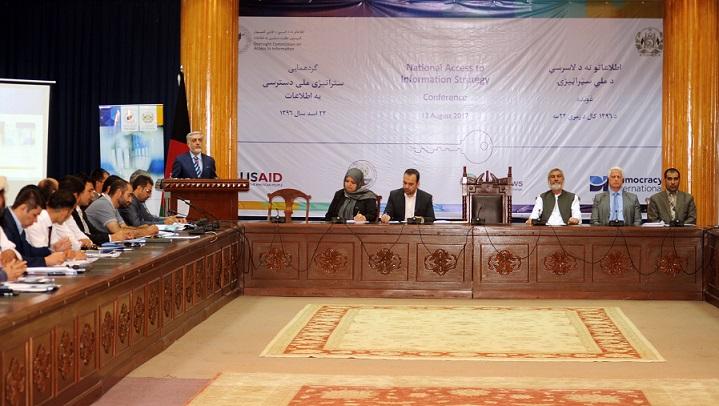KABUL (Pajhwok): Chief Executive Officer (CEO) Abdullah Abdullah on Sunday said access to information was legitimate right of Afghan citizens and the government was responsible to protect that right of the people.
Talking at a ceremony ‘introduction of national strategy of access to information’ at the Government Media and Information Center (GMIC) here, Abdullah said government organs should not keep information hidden from the public.
Sharing information should be a priority in a country where corruption was widespread and its impact felt in every aspect of life, the CEO said.
Abdullah expressed concern over lack of people’s access to information and said, “The situation regarding access to information may be better in the capital compared to provinces, but government officials in other parts of the country maybe still do not understand this issue.”
Government spokespersons were trying to share information with people in a better way, but sometimes they received wrong information that eroded people trust, he added.
Abdullah termed access to information legitimate right of Afghans and said the procedure of sharing information with people should be simplified.
The CEO said the access to information law had been developed in accordance with the society requirements and humanitarian experience. The officials should have complete information while sharing it with people so people could trust.
He called as important independence of the Oversight Commission on the Access to Information (OCAI) because civil society and people wanted sovereignty of the commission for better supervision of government organs.
However, he said: “Unfortunately things did not go the way the commission was expecting and the commission faced with budget problems, but we would help it with facilities.”
Investigative reports had helped the government a lot and focusing more on such reports was essential, he said.
Sayed Akram Afzali, OCAI head, talked about progress of the commission and said presenting the national strategy on access to information was the commission’s latest productive step that was introduced today.
“Civil society institutes in cooperation with the media as real actors have pushed the government towards transparency, these institutes have struggled for making the government accountable, encouraging people to demand access to information and force government organs to share information, so civil society institutes are the real link between the right owners and officials,” he said.
He said OCAI always tried to provide effective plans and procedures, including the national strategy for access to information, for simplification and acceleration of sharing information to citizens of the country.
Danish Karokhel, a commissioner on OCAI and Editor-in-chief of Pajhwok Afghan News (PAN), speaking on the occasion, termed the role of media outlets and civil society as vital in implementation of the access to information law.
“Media outlets are partners in the national strategy on access to information; if local mass media and journalists help us in executing the strategy, we are confident the country will move towards stability.”
He called the access to information as legitimate right of people, saying the national strategy on access to information should be turned into a national debate and pressure be put on government officials to properly provide information to people. Finally the access to information right would change into a culture, he hoped.
“If people gain access to accurate information, they share precise information with media outlets, but if they are provided with false information, then it subsequently leads to publication of wrong information by media.”
Karokhel said media outlets complained about lack of access to information; but if an official didn’t provide information within three days, the complaining media outlet/person should lodge a complaint against him at OCAI and pursue it until end.
Karokhel, stressing the need for information in investigative journalism, said: “When a journalist is denied access to information, he should prepare a story about it and put pressure on the organization concerned this way.”
The PAN Director also complained against the Supreme Court, saying the apex court besides not sharing information and documents with reporters, its officials refused to be interviewed.
He asked reporters and media outlets to break the locks on information at the Supreme Court and other organizations for the sake of access to accurate information.
James Wasserstrom, Democracy International (DI) chief, dubbed inauguration of the national strategy for access to information as a great step, saying its implementation would put Afghanistan on the path to good governance.
He also called the access to information as legal right of citizens, adding the law on access to information was the best and finest at regional and European Union (EU) level as it allowed people to know their government’s performance and actions.
“If information is put at people’s disposal, they can then see government’s activities, expenditure and corruption in public offices and it is what good governance needs.”
Naseer Ahmad Durani, Rural Rehabilitation and Development Minister, terming the access to information as people’s right, said sharing information could help bring transparency in state’s organizations and ensure good governance.
He said if information wasn’t shared accurately, it could lead to lack of transparency, slowdown and even failure of an organization.
“We have established an information bank at our ministry for accurate and timely access to information and we share information without any limit. We don’t hide anything from people’s sight and that has resulted in transparency at our ministry and all officials are accountable and responsive.”
mds/sns/ma








GET IN TOUCH
NEWSLETTER
SUGGEST A STORY
PAJHWOK MOBILE APP